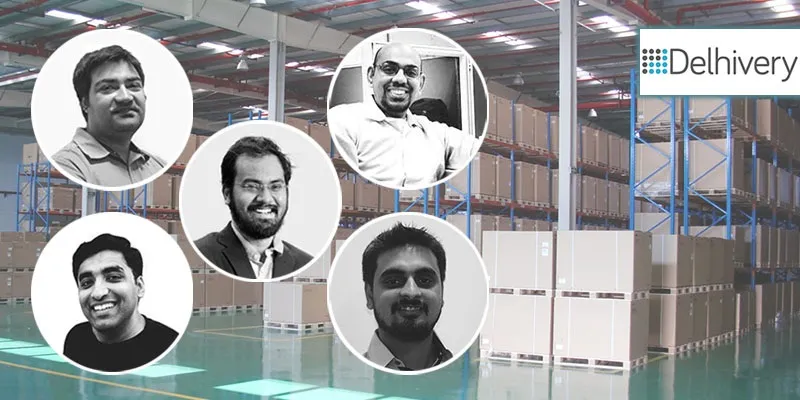India’s B2B boom: Why logistics is the new darling of investors and startups alike
The logistics sector has been on the radar for a while now, but recent funding rounds witnessed by logistics startups Blackbuck, Locus, and Rivigo are shining a spotlight on this sector again – this time in the business to business (B2B) space. So, what makes the logistics sector an interesting bet?

Image credit: Aditya Ranade
When the ecommerce industry took flight in India, one sector that immediately gained prominence was the logistics space, as startups rushed to provide efficient business-to-consumer (B2C) supply chain solutions to online retailers. Now, the large but fragmented logistics sector is once again emerging the darling of investors and startups alike – only this time, in the business to business (B2B) space.
Thanks to the growing need for tech-enabled, innovation-driven solutions to transform the logistics and supply chain market, investor interest in startups in the space has already seen a notable increase. In particular, investor confidence in the B2B logistics tech startups has witnessed a significant boost, which is reflected in the larger ticket sizes of recent investments in the space.
In the past five months of 2019 alone, the logistics sector has already witnessed a capital infusion of $6.25 billion across just eight deals. That’s more than a six-fold increase from the amount it raised last year, across 20 deals.
Of the total $6.25 billion raised this year, $70 million went to Bengaluru-based online marketplace for trucking Blackbuck’s Series D round, while another $22 million went to AI-backed supply chain optimisation startup Locus.
Alok Goyal, Managing Partner, Stellaris Venture Partners, told YourStory,
“B2B, unlike B2C, isn’t a winner-take-all market, especially in logistics, which in itself is a massive market. The space is large enough to accommodate 10-20 billion dollar companies that can execute well, and generate strong revenues and bottomline. This makes the space automatically interesting to us as investors.”
Also read: Meet the 6 startups that aim to disrupt logistics sector using technology
The space for billion-dollar startups?
To be clear, the trend towards companies with over a billion dollars in valuation may well be unfolding, in turn, bolstering investor optimism and confidence in the space.
Already this year, India produced its first unicorn – a startup valued at $1 billion or more – in the logistics tech space, while a number of other B2B startup have inched closer to becoming the next unicorns.

Delhivery, India's first unicorn in the logistics space, is the brainchild of five co-founders -- Sahil Barua, Mohit Tandon, Bhavesh Manglani, Suraj Saharan, and Kapil Bharati.
Earlier this year, Gurugram-based Delhivery became the first Indian logistics provider to achieve unicorn status. Similarly, B2B logistics tech startups Blackbuck and Rivigo both achieved soonicorn status with their recent fund-raises, while rival Locus raised funds from marquee investors like Tiger Global and Falcon Edge.
Locus Co-founder Nishith Rastogi told YourStory that it was the company’s growth and future growth prospects that convinced the investors. He says,
“They were amazed by the fact that companies like BlueDart, which have existed for decades and are experts in logistics, are not only our clients, but large-scale clients. And that we’ve delivered double-digit efficiency gains, which is huge.”
But Nishith says that for Locus – which currently serves more than 40 clients globally, with Deutsche Post’s Blue Dart and online grocery brand BigBasket among its large-scale clients – the focus is not just on achieving a billion-dollar valuation. Instead, it’s in generating billion-dollar-revenues, he adds.
Four-year-old Locus – which operates in ecommerce, third-party logistics, fast-moving consumer goods and retail, and human movement sectors – employs proprietary algorithms and deep learning to provide route optimisation, real-time tracking, insights and analytics, dynamic sales journey plans, efficient warehouse management, and vehicle allocation and utilisation.
Also read: The lowdown on Locus' $22M funding by Falcon Edge and Tiger Global

Scope for technological disruption
As with Locus, investors believe innovative B2B logistics startups employing cutting edge technology such as robotics, automation, data analytics, and Internet of Things (IoT), have the potential to significantly disrupt the logistics market.
Navroz D. Udwadia, Co-Founder of Falcon Edge Capital, which recently invested in Locus, said,
“We believe the trillion-dollar global logistics market is ripe for disruption via technological change, particularly AI and Machine Learning driven solutions. With Blue Dart and other prolific anchor customers, the (Locus) team has demonstrated the ability to build and deliver cutting edge technology and algorithmic driven outcomes that provide attributable ROI to the enterprise at scale.”
Still, investor interest in the B2B logistics space is also driven by their belief that the B2C logistics play has largely played itself out.
In 2014-2015, the focus was on B2C logistics players. This time, investors are looking at startups that cater to more than just the needs and demands of the B2C space by providing services, such as cash on delivery, app tracking, and routing.
Today, B2B logistics startups that provide the tech to address the whole spectrum of logistics and supply chain needs of large organisations – from last-mile delivery, warehousing operations, freight transportation, to demand forecasting, among others – are in focus.
“The (logistics startup) founders have tried different models. There have been experiments and consolidations. Therefore, everyone seems to be bullish about logistics,” says Stellaris Venture Partners’ Alok Goyal.
“Ecommerce plays a tiny part of the larger logistics sector. In retail alone, there is a huge logistics play just in terms of distribution and supply chain management,” he adds.

On a similar note, Arpit Agarwal, Principal, Blume Ventures, says, “Everything we buy reaches us after passing through multiple hands. The distribution network needed for large retail businesses is vast, and logistics forms a key part of that network.”
Indeed, India’s tech-based logistics startups are looking to offer solutions to existing challenges in supply chain management by leveraging disruptive technology.
Stellaris Venture Partners’ Alok Goyal says, “From the factories to the distribution units to the retailers or their warehouses, to the final end users, the supply chain network is vast and wide. And at each stage of the supply chain, we see the potential for technology disruption.”
Raghuram Talluri, Co-founder and CEO of Bengaluru-based logistics startup LoadShare, outlines the opportunity that logistics startups have to change the vast market through technology.
Raghuram says,
“Close to eight percent to 10 percent of the retail segment is organised, and in logistics only two percent is. And this is with all the players in the space.”
“The reality is that companies are facing serious challenges with regards to capacities. Volatile demand patterns, throat-slitting competition, rising fuel costs, and expediting deliveries are, if anything, a serious dynamic cost,” says Kushal Nahata, CEO of logistics startup FarEye, adding that tech-based logistics startups are now looking to offer related solutions.
In the trucking logistics segment too, truck owners face several problems in terms of discovery, tracking, transaction, routing, and even safety, says Alok. Thus, technology has the potential to add significant value to the complex supply chain space, as the cost of the fragmented market affects the whole supply chain.
According to Associated Chambers of Commerce (ASSOCHAM), India can save over $50 billion if the cost of logistics and transportation is reduced from around 14.4 percent of GDP to nine percent of GDP. By comparison, other developing countries spend less than eight percent of their GDP.
India also ranks 35th in the World Bank’s Logistics Performance Index, underscoring the low efficiency of logistics in India, when compared to that in other countries. This also highlights the potential to make significant inroads to disrupt the large and growing logistics market in India.
Also read: Logistics tech is going places, but when will the cash burn stop?

A long road ahead
And yet, despite its market size and opportunity to disrupt, logistics is still a tough business to crack.
“One of the biggest challenges of logistics is matching the supply and demand and then finding the perfect technology play that works to match it,” says Alok.
The Indian logistics landscape is also fraught with challenges related to poor infrastructure owing to poor road connectivity amidst a slew of regulatory hurdles, say industry experts. The understanding of the space is also limited, say investors, despite the growing crop of players in the field.
Even with the different players in the space, logistics in India is just scratching the surface, says Raghuram. He believes people intuitively have a lesser understanding of the nuances of the space, especially B2B logistics where there are many variables.
But once you understand the space, the space is yours to win, say investors. As Raghuram rightly sums up,
“Logistics is an intensive business and you need to understand the different nuances. If you get that, then there is no stopping you.”
Also read: BlackBuck among six startups turned operationally profitable in FY18







